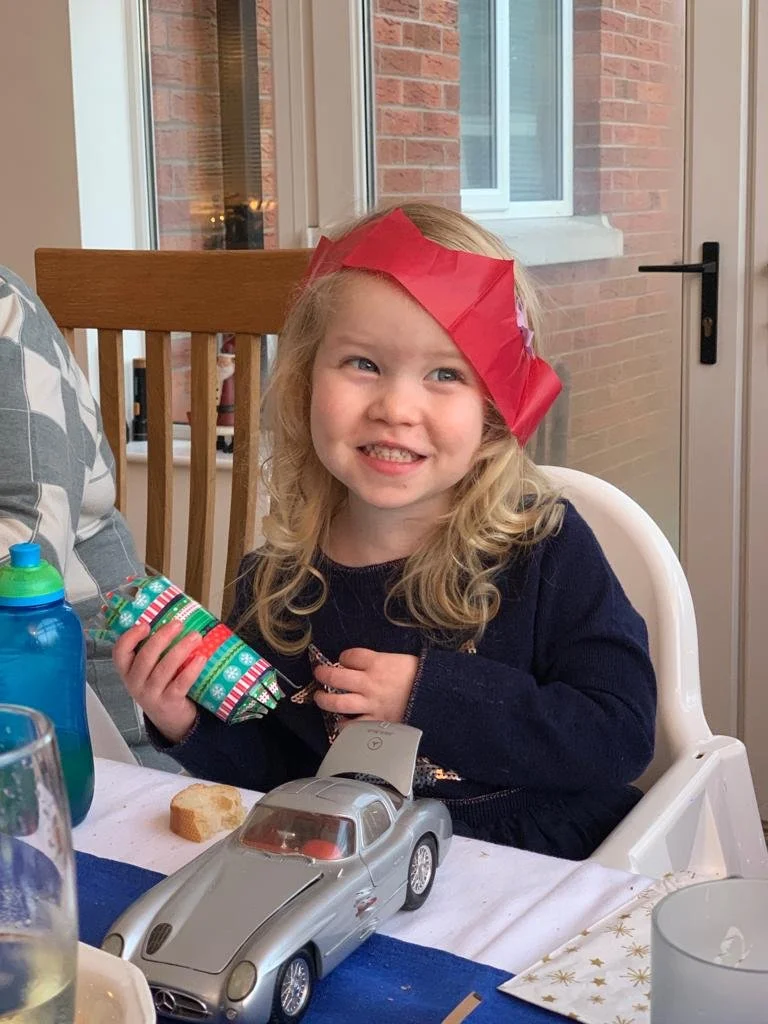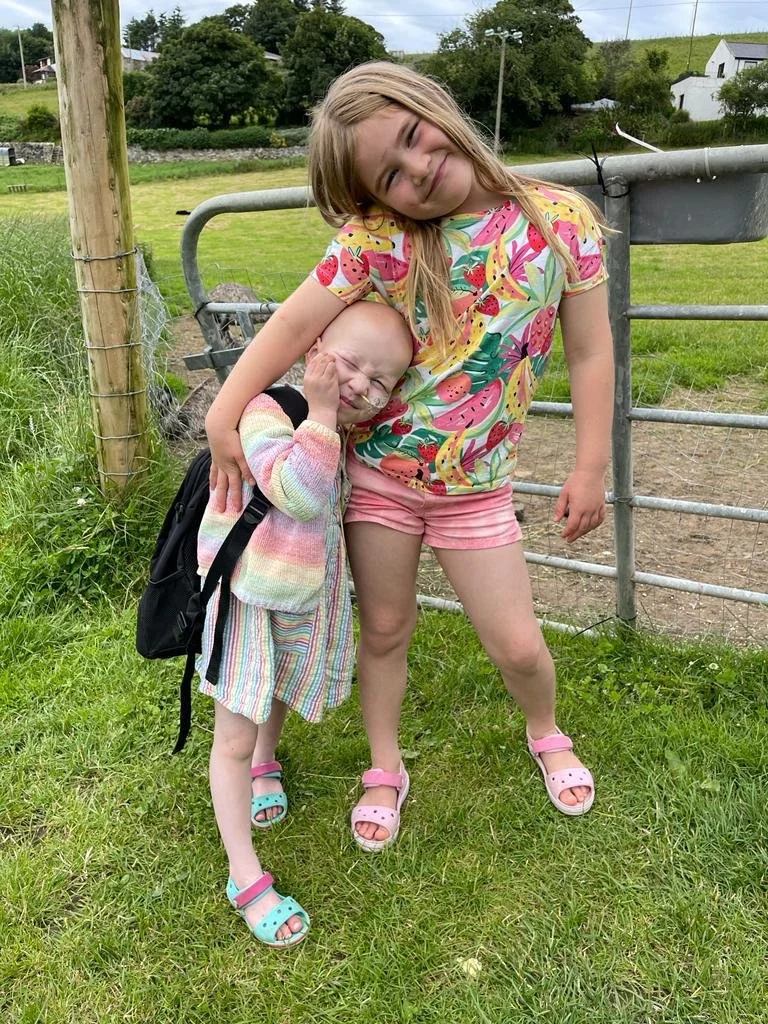Tilly’s Story
Tilly was diagnosed with Stage 4 Neuroblastoma in November 2021 and sadly passed away in September 2022 at the age of four. Tilly’s dad, Jonathan, shares her story here…
Matilda, or Tilly as she liked to be called, was our second child, born three years after our daughter, Emily. She was a lovely little girl with a cheeky sense of humour, full of smiles and laughter. She had a wonderful imagination, loved dancing and music, and was forever creating videos with her sister on our iPad.
In September 2021, when she was three-years-old and just starting nursery, she started complaining about her legs being sore. We also noticed that she had become very picky about her food and seemed to have lost her appetite. At the time, it was impossible to get a face-to-face appointment with a GP, but after several phone consultations, it was suggested we take Tilly to A&E.
The doctor at A&E felt there were a few possible explanations for Tilly’s symptoms, one of them being an irritable hip, but given that she also had a cold and cough, it was most likely that she had a viral infection and we were sent away with ibuprofen. For a little while, her symptoms seemed to be subsiding, but then they started up again. We booked another appointment to see the doctor.
The weekend before we were due to go to the doctor, we were all away for the weekend at a family occasion. While we were away, Tilly began complaining about stomach ache, she was sick during the night, seemed lethargic and appeared to be generally unwell. On our return, our childminder felt increasingly uncomfortable about the situation and suggested she took Tilly to A&E. Various tests were carried out there – my wife Bethan was called to the hospital and by the time I arrived later that afternoon, Tilly had been transferred to a cancer ward. This was a massive shock to us.
It had been around six weeks since I had taken her to A&E originally and as a parent, it was hard not to look back and wonder whether I should have done more sooner. It was torture wondering whether I should have spotted the signs earlier, whether ultimately, an earlier diagnosis would have made any difference to Tilly’s journey.
We were told that Tilly could have one of three things, with Neuroblastoma being the most likely, but also the worst option. Pathology confirmed she had Stage 4 Neuroblastoma. She had tumours in her bones and by then, she also had a black eye, indicating it was in her brain too.
The doctors were not overly bleak, but they were realistic. There was optimism in the fact that there was a path of treatment on offer for Tilly, but the odds were about 50/50 that she could survive this. There was sufficient optimism for us to take the decision that, while she was under anaesthetic to have her Hickman line fitted, she should also have her eggs harvested in case she wished to start a family in future.
The plan was for Tilly to undergo chemo, then surgery and then a stem cell transplant. She went through about 12 rounds of chemo, but her response to the chemo was deemed inadequate, meaning the treatment had failed to have the intended effect on her tumours. This was hard to comprehend. A few extra rounds followed and these seemed to do the trick. By mid-July, she would undergo surgery.
Between the end of her treatment and her surgery, we were able to take a family holiday. We agonised over whether this was the right thing to do, but the medical team made sure that we had that time together and that it would not jeopardise Tilly’s health. In hindsight, this was a special experience and an opportunity for us to be together as a family, creating memories. Tilly had a wonderful time. She was able to horse-ride and paddle in the sea. It was a truly positive experience and none of us realised what was just around the corner.
Tilly did not recover well from her surgery. She remained in hospital for two weeks afterwards, during which time she was in a lot of pain, she struggled to maintain weight and was not sleeping well. She eventually came home in early August, but had to go back into hospital when she contracted C.diff. Over a period of about a month, she was in a lot of discomfort and it was hard to see her in pain.
Scans revealed that her tumour had returned really aggressively and it became apparent that she was not going to survive this. After one final blast of chemo, we were told that there was no point in further treatment and on 29th August, her care became palliative. By the beginning of September, we were aware that Tilly maybe only had a matter of weeks left. We wanted to bring her home and as my sister was a nurse, we put measures in place to have support and care for her at home. However, before we were able to carry this out, Tilly passed away.
It was incredibly tough for the whole family. Our daughter Emily had only been allowed on the ward to see Tilly the day before she died and although Tilly was too poorly by then to play with her, she was able to give her a big hug. After Tilly’s death, Emily went through several sessions of grief counselling in the form of play therapy. This was hugely helpful, but of course, she still struggles with the loss of her sibling.
For Bethan and me, it has been a very tough time. We were both determined to return to work, believing this would help. I am not entirely sure that it did. The first year after losing Tilly was really hard, but I suppose to some extent you are living in a bubble, not quite believing it is real. I think this past year has been even harder for me. Accepting the new normality and our new reality has been difficult. Noticing the milestones that should have been, like Tilly starting school, provide reference points and a framework that can be emotionally triggering. As a family, we have allowed ourselves to recognise the difficulties we have faced and to see things through that lens. But it is hard not to be reminded of our experience by little things every day.
Tilly was hugely courageous, really brave, she never complained and made the most of whatever awful situation she was in. She would turn her hospital room into a playroom and was determined to have fun, no matter what. Only once, in the last week before she died, did she say ‘I just can’t do this anymore’. She was in so much pain. It was heartbreaking to hear those words, but even then, she was not giving up. She didn’t like a lot of the things that were done to her while she was in hospital, but she soldiered on and found ways to cope.
Early symptoms of Neuroblastoma are scarily similar to minor ailments, and cancer is a terrifying word for any parent to hear, particularly if it turns out to be something much less serious. If there is one positive to come out of Tilly’s passing, I would want it to be a focus on developing better methods of early detection and intervention for young children with Neuroblastoma. If that could be encouraged, perhaps many more young lives would be saved…
Funding vital research. Saving young lives.
We fund vital research to develop new and more effective treatment for children with neuroblastoma. But we need your help. Please donate today and join the fight against childhood cancer.



